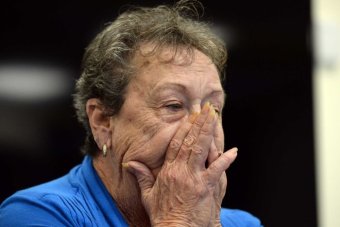A landmark test case on patenting the breast cancer gene will begin in the High Court of Australia in Canberra today.
Queensland cancer survivor Yvonne D’Arcy brought the case against US company Myriad Genetics after it was granted the patent to a hereditary gene associated with an increased risk of cancer.
Ms D’Arcy argued the genes existed in nature, so were discovered rather than invented.
Myriad Genetics holds the patent over the BRCA 1 and BRCA 2 genes which, if present, dramatically increase a woman’s chance of developing breast and ovarian cancer.
Actress Angelina Jolie drew attention to the BRCA 1 gene in 2013 when she revealed she had a double mastectomy after she learned she carried the gene, which has killed several women in her family.
Lawyers for Ms D’Arcy are expected to tell the High Court today that the genetic material covered in the patent has merely been isolated, and is not eligible to be patented under Australian law.
In Australia patent law, material that occurs naturally has long been subject to what is known as the manufacture test.
It requires an invention to consist of an “artificially created state of affairs with economic significance” to determine if it would exist in nature.
But Myriad Genetics is expected to tell the High Court that the patent applies to a product, an isolated nucleic acid, that is chemically, structurally and functionally different to naturally occurring DNA.
The company has already succeeded twice in the Federal Court, but Ms D’Arcy is hoping the High Court will take a different view, particularly in light of a ruling against the patent in the United States Supreme Court.
Specifically the US Supreme Court ruled that naturally occurring DNA was a product of nature and not patentable.
“Myriad did not create anything,” Justice Clarence Thomas wrote in his ruling.
“To be sure it found an important and useful gene, but separating that gene from its surrounding genetic material is not an act of invention.”
But the court did recognise synthetic DNA created in a laboratory, known as cDNA, was not a product of nature and could be patented.
Myriad Genetics’ lawyers said the law in the US did not reflect the law in Australia and the legal test in the US differs, asking only if the material “is a product of nature”.
In Australia, the manufacture test applies.
This arose from a case in 1959, when the court ruled in favour of patenting a new type of weed killer that did not harm crops, but was made from already known compounds.
Myriad said under Australian law the emphasis was on the differences in the structure and function of the genetic material and not the similarities as it would be in the US.
The company believed the US ruling supported the Australian patent because the material in use was isolated from the gene, creating a “non-naturally occurring molecule”.
At the time Jolie made her revelation, a test for the genes cost about $3,000 in the United States, partly because Myriad Genetics held control and blocked its competitors from running the tests.
More information on human gene patenting:
- The BRCA 1 and BRCA 2 genes were isolated and sequenced by researchers at Utah University in Salt Lake City in 1994
- Myriad Genetics was assigned the patents on the isolated sequences and the cDNA variants
- At the time of the US Supreme Court ruling there were concerns about future investment in medical research when patents could be at risk. But there were also claims the ruling could free up research in the area.
- In Australia there have already been calls for the Federal Government to legislate against gene patents.

